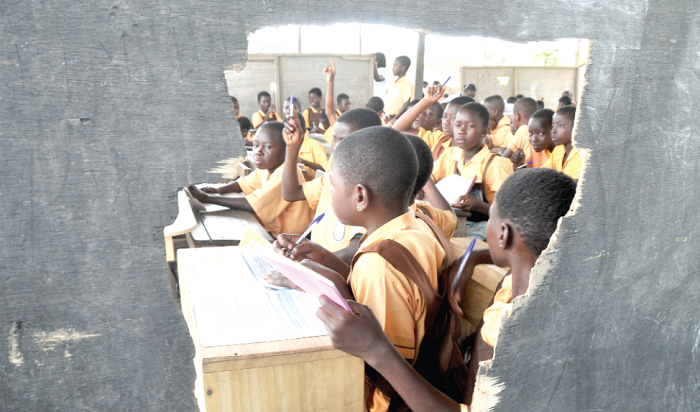By: Tabitha Kugbonu | Voltaonlinegh.com |
Education’s aim is to eradicate poverty and ignorance among citizens. Education is a human right for every Ghanaian child. It equips pupils and students with knowledge, self confidence as well as raising the awareness that education is their right.
As a nation, it is our core mandate to ensure that we provide quality education to pupils and students by providing life-long learning opportunities for all in order to achieve Sustainable Development Goals (SDGs).
Infrastructure challenges in some rural communities keep making it tedious for academic success of those who happen to attend these schools which result in the non-performance of pupils and students at both the Basic Education Certificate Examination (BECE) and West African Senior School Certificate Examination (WASSCE).
Governments over the years have been working around the clock to impact and reform the educational sector, but there are still some schools especially in the rural areas where pupils and students learn under trees or dilapidated classrooms and other unfavourable conditions. Such is a situation of a school at Dabala in the South Tongu District of the Volta Region.
Students of Dabala Senior High Technical School (DASTECH) have been learning under structures roofed with thatch, a situation that worsened since the implementation of government’s flagship programme, Free Senior High School (SHS) Policy from the 2017/2018 academic year.
Last year, the school was asked to admit 880 fresh students out of which 650 were admitted due to the infrastructure constraints. Adding that number to those of second and third year students gave the school, a total student population of 1, 070.
The result of the huge number was that dormitories, classrooms and other teaching and learning materials that would enable students have a sound mind for their studies became overly stretched.
This informed a decision by the academic board to hold a meeting and it was decided that fewer students would be admitted this year.
Currently, teachers in DASTECH have resorted to the use of mega phones in packed classrooms to enable students hear their voices to understand what whatever they say in class as each classroom now accommodates about 180 students especially in the General Arts Department.
The situation gets worse because the packed classrooms are not well ventilated.
The school, unable to look on unconcerned, undertook a self-help project by putting up a temporary structure for the use of first year students. However, that is still woefully inadequate to contain the large student population.
In an interview with Mr. Simon Addae-Conutsey Aklomasa, the outgoing Headmaster of DASTECH, he decried the infrastructure challenge in the school saying it stifles teaching and learning.
He therefore called on government to come to their aid in finding a lasting solution to the problem.
Reacting to the issues, Hon Kwabla Mensah Woyome, Member of Parliament (MP) for South Tongu said it had been on his agenda at the time he resumed office as the MP to help transform the school to become one of the best schools in terms of infrastructure and performance.
According to him, he started a storey building project in the school in collaboration with his brother, Alfred Agbesi Woyome which had been completed and currently in use by school.
He intimated that he impressed upon the former District Chief Executive (DCE), Mr Amelorku to start another school building project before he left. However, surprisingly, subsequent DCEs abandoned the project leaving the school with the only storey building project that he and the brother completed.
Mr Woyome pledged that he will find a lasting solution to the problem because they are fighting for quality education and not quantity education.
The issue of DASTECH is not in isolation but a reflection of what pertains in schools that are situated in peri-urban and rural communities across the country.
The question then is; must we as a people fold our arms and see pupils and students dropping out of school before we do something about the situation? Does it mean that if government cannot solve the problem we cannot get benevolent persons to solve it?
In Ghana today, it appears our educational sector is now based on, “because I’m not in his or her political party, I won’t assist him/her in the ongoing projects.”
These have caused a lot of government projects to stall making life unbearable for the ordinary Ghanaian.
If we do not change our mindset, how then do we achieve the “Ghana Beyond Aid” agenda which was the theme for Ghana’s 60 years independence celebration, which must be embraced by every Ghanaian considering how we wish to be known as the “Black Star of Africa”?
As a country, let us all keep it in mind that education is the tool on which we can change the world. Let us not jeopardise the future of our present and the coming generation and by extension, our beloved country. This we can only do by first strengthening our educational sector.
NB: The writer is a Broadcast Journalist
Source: www.voltaonlinegh.com




